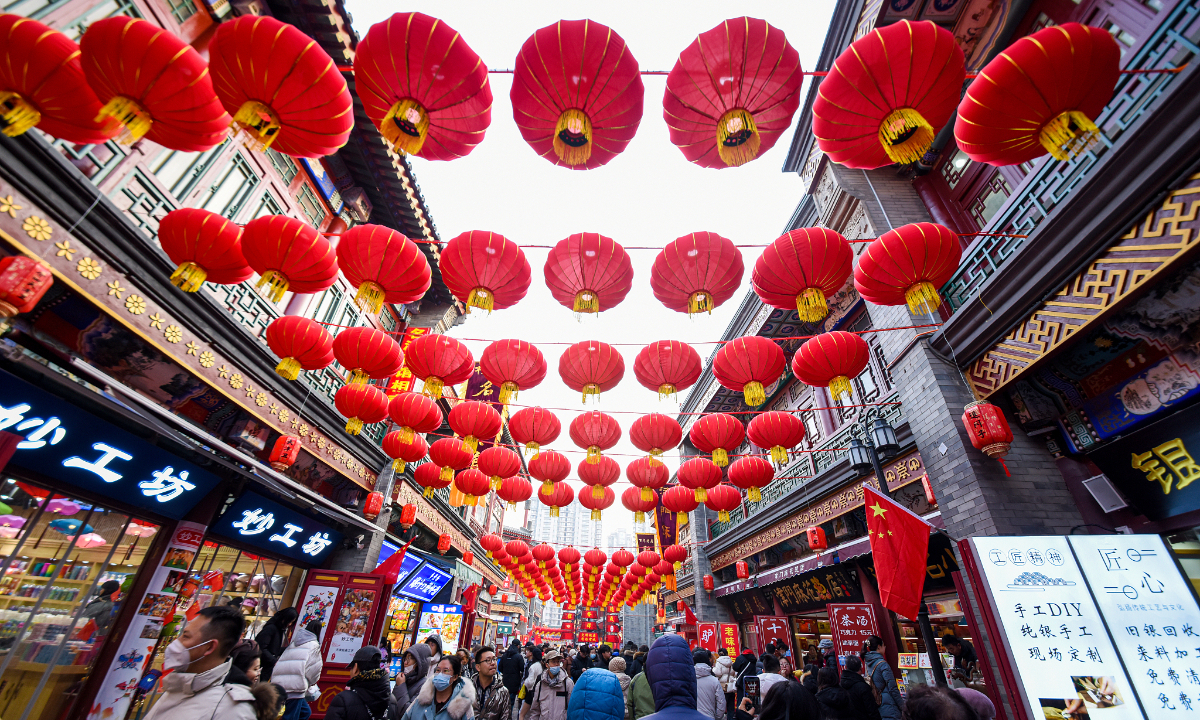Carry on historical memories
Chinese President Xi Jinping highly values culture and has a profound understanding of culture which has strengthened over time. Culture plays a vital role in inspiring national spirit, carrying forward civilizations, and promoting social development and well-rounded personal development.
As the most important traditional Chinese festival, the Spring Festival, or Chinese New Year, is viewed as particularly important by President Xi. During this time, he celebrates with both government servicepeople and ordinary citizens, extending well wishes of good luck to them.
For a non-Chinese person, nothing does better to help understand the people and culture of China than viewing ordinary people's Spring Festival stories. At this special occasion of the year, Chinese people travel for family reunions, celebrate in various forms, and share cohesive feelings about home and the country.
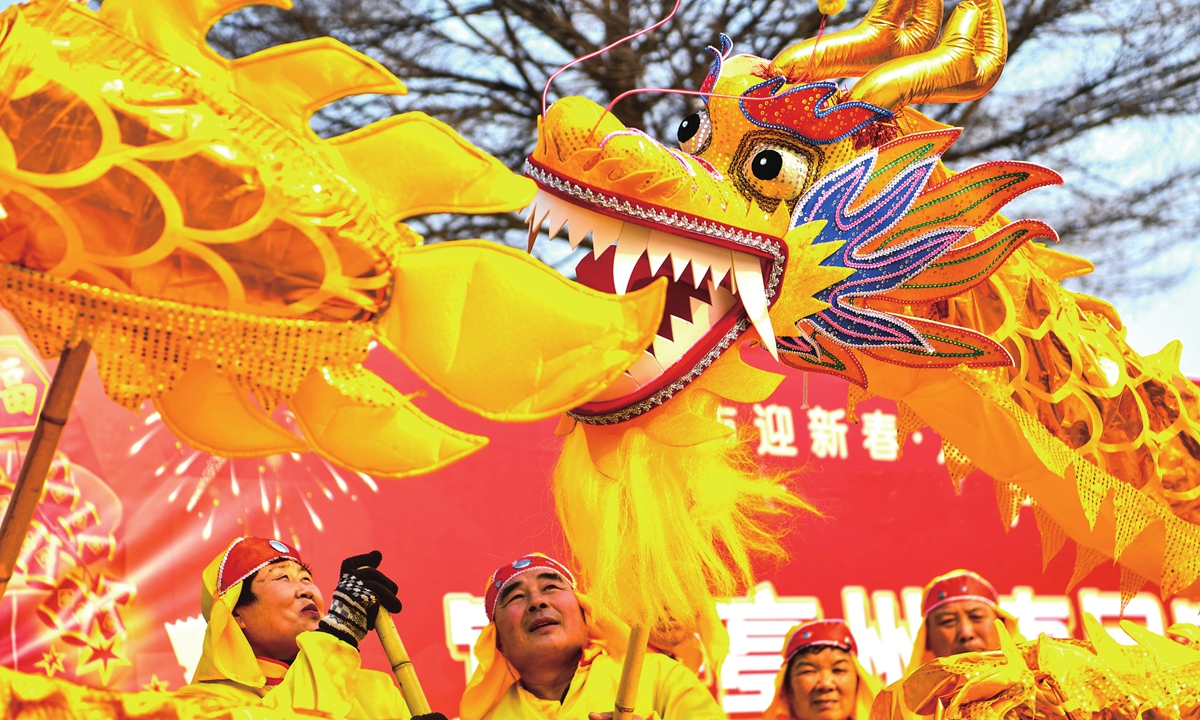
People perform a dragon dance during Spring Festival. In a Chinese dragon dance, the dragon's head biting its tail implies good luck. Photo: VCG
On the afternoon of February 1 ahead of Spring Festival, President Xi arrived at Tianjin's Ancient Culture Street. Walking along this street that possesses an air of antiquity, he stepped into several shops such as Guifaxiang 18th Street Mahua, Nut Products Zhang, Clay Figurine Zhang, and Yangliuqing New Year Painting, asking about the categories and sales of their products, as well as the inheritance and development of China's traditional cultural heritages.
On the streets, drums and music were clanging, and dragon dance and lion dance performances were lively. Xi walked closer to everyone and extended Chinese New Year greetings to the people of Tianjin and the people of all ethnic groups in China.
Xi said that seeing local residents and tourists beaming as they enjoyed traditional folk performances, he could feel the rich flavor of the Chinese New Year. The Chinese leader attaches great importance to the festival, which is celebrated by all Chinese in and outside of the country every year.
The Spring Festival has a long history, not only containing profound cultural connotations, but also carrying historical and cultural heritages during the process of Chinese modernization, experts said. Chinese New Year is a time when people bid farewell to the old and welcome the new, and a time that carries deep friendship and emotional bonds. Various Chinese New Year celebrations and customs are being held across the country with strong regional characteristics and around the world. These activities are mainly about removing the old and bringing in the new, exorcising evil spirits, receiving blessings and praying for good luck. The holiday is rich and colorful and embodies the essence of traditional Chinese culture, experts said.
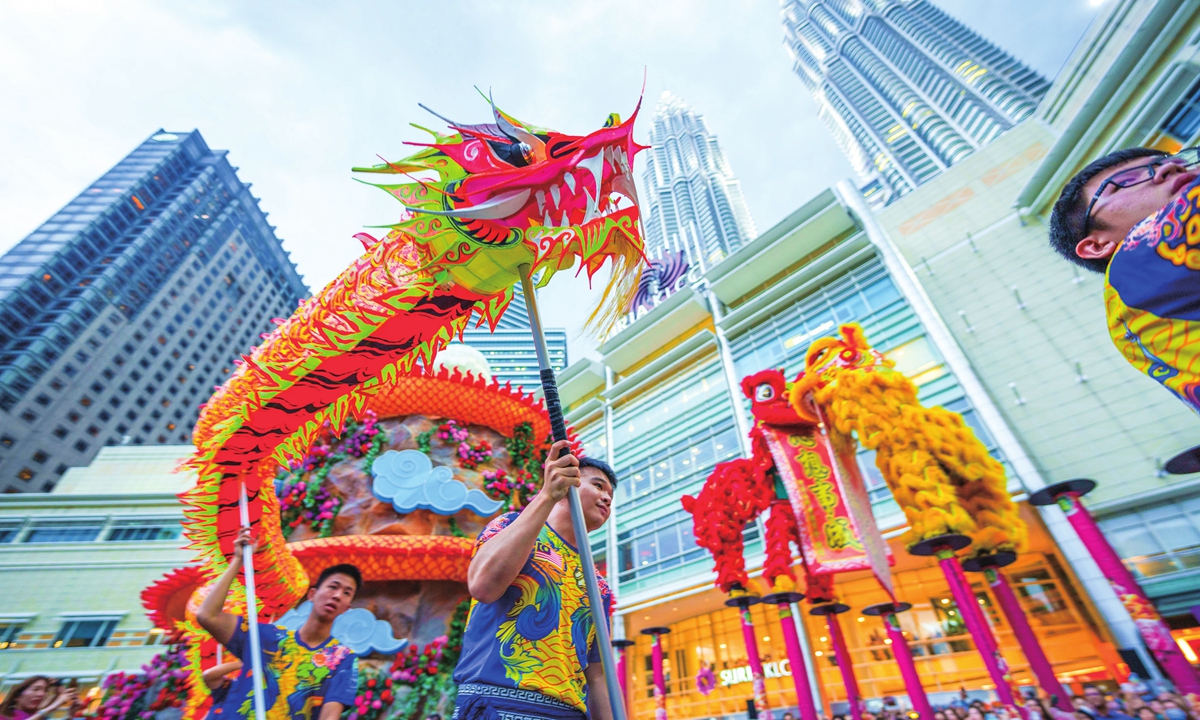
People perform Chinese dragon dance in Kuala Lumpur, Malaysia on January 18, 2024. Photo: VCG
From fortune to prosperity
Thousands of kilometers away from Tianjin, in the bustling cities and verdant countryside of South China' Guangdong Province, streets teem with life as communities prepare for the festivities ahead.
The Chinese New Year festivities come alive with the exhilarating rhythm and vibrant spectacle of performances such as dragon and lion dances, as well as the captivating Yingge dance in the Chaoshan region in the east of Guangdong.
These time-honored art forms, deeply rooted in Chinese culture, play a central role in ushering in the auspicious occasion of the Chinese New Year.
Pointing out the coming lunar year is the Year of the Dragon, Xi noted that in Chinese culture, the dragon has multiple connotations, such as representing courage and endeavor, infinite vitality, and good luck and carries people's good wishes for and visions of the future. He said that everyone should have confidence in the coming year and live a better life.
The dragon dance, with its sinuous movements and spectacular dragon costumes, symbolizes power, prosperity, and good fortune. Accompanied by the rhythmic beats of drums and cymbals, the dragon weaves its way through streets and alleyways, captivating audiences with its majestic presence.
Similarly, the lion dance, characterized by its colorful lion costumes and acrobatic feats, is performed to ward off evil spirits and bring blessings for the year ahead.
The tantalizing aroma of local delicacies often attracts thousands of tourists to Guangdong, but during the Chinese New Year, the region has a lot more to offer.
Families gather to feast on niangao, or glutinous rice cakes, symbolic of prosperity and advancement in the new year.
A top go-to destination for local people is the flower markets, a vibrant place brimming with a kaleidoscope of colorful blooms and fragrant blossoms.
The choice of going to the flower market is also embedded with auspicious expectations for the Chinese New Year, noted Wei Zhiyi, a Shenzhen local, as the pronunciations of the word "flower" and "prosperity" are the same in Cantonese.
"Families flock to the flower markets in search of auspicious plants and flowers to adorn their homes," Guangzhou local Chen Wenxia told the Global Times.
Symbolism plays a crucial role in the selection of floral decorations, with certain blooms believed to bring prosperity, good fortune, and happiness in the coming year.
"Peach blossoms, representing longevity and vitality, are a popular choice; while kumquat trees, laden with golden fruits, symbolize wealth and prosperity," Chen noted. "Orchids, with their delicate beauty, are cherished for their association with refinement and elegance."
The diversity of colors is also echoed in Zigong in Southwest China's Sichuan Province, where the local people keep the tradition of going to the lantern festival, a tradition that dates back to the Tang Dynasty (618-907).
Every Chinese New Year, the city brings up some giant and mesmerizing lanterns that transform the city into a luminous wonderland with intricate lanterns casting rays of different colored lights.
"The lantern festival attracts not only locals but also visitors from afar who come to marvel at the stunning array of lanterns," a local official surnamed Xie told the Global Times.
The lanterns feature a diverse range of themes, from traditional Chinese motifs such as a 202.4-meter-long Chinese dragon that was made using nearly 200,000 used plastic bottles to modern interpretations of cultural symbols like the flying Apsaras icons from Dunhuang murals.
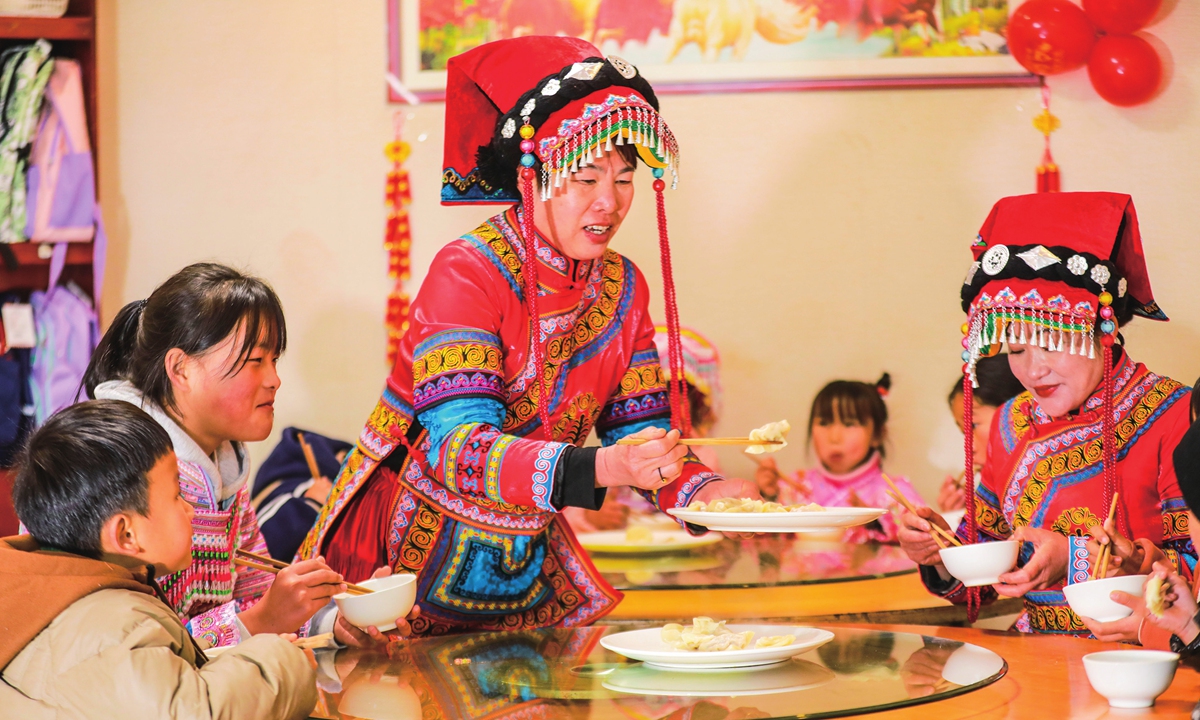
People in Bijie, Southwest China's Guizhou Province have dumplings together.Photo: VCG
Close blood bonds
Xi has previously addressed a festival reception at the Great Hall of the People in Beijing, where he extended his greetings to all Chinese in the mainland, in Hong Kong, Macao, Taiwan and abroad.
His greetings to all Chinese people with references to hard work and family values have struck a chord with overseas Chinese.
Until now, overseas Chinese keep the Chinese New Year traditions well and intact. The tradition of staying up late during Chinese New Year's Eve has also been kept by many families overseas that boast Chinese ancestry.
Even among second or third generation overseas Chinese, most young people follow these traditions and customs for the traditional Spring Festival just as their fathers, grandfathers and even great-grandfathers did.
Vindy Marcelina, a 24-year-old student from Indonesia, told the Global Times that many of her distant ancestors came from East China's Fujian Province, while her grandpa went to Indonesia from China when he was a child.
Until now, they still keep a lot of traditions to celebrate the Spring Festival.
According to Marcelina, in the morning of the day before the Chinese New Year, the family will have a prayer ceremony to god and their ancestors. At night they will have a family dinner together.
"We also have dishes that are a must have at Chinese dinners like fish, noodles, dishes with 10 types of food, and a sweet niangao [Chinese New Year sweet rice cake]. After having dinner we will stay up until midnight."
During the Chinese New Year, Marcelina's family will also visit her relatives' homes for bainian, which means to greet and wish each other luck during the new year. The big family will gather in the home of Marcelina's oldest aunt. They will have lunch together, express wishes for the New Year in the southern Fujian dialect, and members of the family that have already gotten married will give the younger members some red envelopes full of money.
Global celebration
Shan Jixiang, former curator of the Palace Museum, told the Global Times that the Spring Festival is the most traditional festival of the Chinese nation as it is a kind of cultural inheritance and embodies Chinese people's wishes to "go home for the New Year."
The 78th United Nations General Assembly unanimously passed a resolution in December, officially designating the Lunar New Year, also known as the Spring Festival, as a UN floating holiday. Chinese experts said the decision indicates the increasing global recognition of China's culture and its influence, which will contribute to the promotion of the Global Civilization Initiative.
As the Global Civilization Initiative proposed by President Xi says, in spite of differences in histories, cultures, political systems and development phases, countries around the world share a common aspiration for peace, development, equity, justice, democracy and freedom, the common values of humanity.
This Lunar New Year belongs to China and the world as well, as it is becoming a global celebration that transcends geographical and cultural boundaries. With rich cultural connotations such as paying tribute to one's ancestors, praying for good luck, respecting nature and expelling evil spirits, the Spring Festival has aroused emotional resonance among many people in the world.
"The Spring Festival is always a time that all the people hope to share happiness and hope with close families, friends and relatives," Sun Jiashan, an associate researcher at the Central Academy of Culture and Tourism Administration, told the Global Times on Wednesday.
Chinese welcome Year of Dragon with confidence amid nation's growing intl prestige
China's top leader as well as diplomats from around the world have extended greetings for the Chinese Lunar New Year, ...
China's top leader as well as diplomats from around the world have extended greetings for the Chinese Lunar New Year, ..
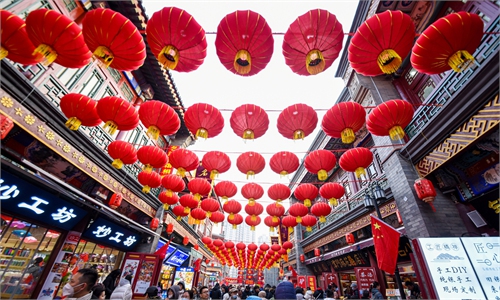 Xi's Footsteps: Xi's 12 years of greetings and visits before Spring Festival touch hearts, demonstrate Party's emphasis on people's livelihoods
Xi's Footsteps: Xi's 12 years of greetings and visits before Spring Festival touch hearts, demonstrate Party's emphasis on people's livelihoods
While China prepares for the Spring Festival, also known as the Chinese Lunar New Year, President Xi Jinping extended messages of good wishes, support, and confidence for 2024 to all Chinese people during his inspection tour in North China's Tianjin Municipality on January 1 and 2.
Related post:

